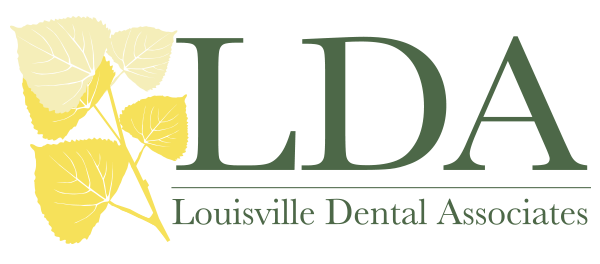How To Deal With Receding Gums

Your family dentist in Louisville wants patient to understand the risks their oral health faces on a daily basis. After all, a number of recent studies have found compelling links between an individual’s oral and overall health. Research has shown that patients who suffer from gum disease and tooth decay and a significantly higher risk of developing a range of chronic illnesses that include cardiovascular disease, diabetes, obesity and dementia. Lowering your risk for these diseases means maintaining and improving your oral health.
One of the biggest risks your oral health can face is a condition known as gingival recession, or commonly referred to as receding gums. For patients suffering from gum recession, the healthy pink tissue that normally covers and protects the delicate base of their teeth begins to pull away. This exposes the roots of a tooth to harmful oral bacteria that can slowly infect and erode the healthy tissues that hold our teeth in position.
Receding gums are a very common condition which often goes unnoticed during the early stages. While there are a variety of risk factors for gum recession, age ranks as a primary risk factor. Approximately 88 percent of adults 65 and older suffer from gum recession that impacts at least one tooth.
The primary concern regarding gum recession is that when the roots of teeth become exposed, they are at a higher risk of infection and decay. While treatment can stop and reverse the damage harmful oral bacteria can have on our teeth, the condition needs to be spotted and treated early on.
In cases where gum recession becomes severe, patients may develop symptoms that include: general discomfort, pain when eating, sensitivity to hot or cold foods and infection. Fortunately, your family dentist in Louisville has several options when it comes to treating gum recession.
What Causes Gum Recession
The most common cause of receding gums is poor oral hygiene. Patients who fail to brush and floss daily, and who don’t receive regular dental exams and cleanings, have a higher risk of developing a range of oral health problems such as cavities, gum disease and gum recession. However, even patients who practice outstanding daily oral hygiene can also be at risk of receding gums.
In addition to poor oral hygiene, there are two common causes for gum recession.
- Physical wear to the gums caused by years of use
- Gum inflammation, a natural reaction of the body’s immune system
Some patients have a higher risk of gum recession due to inherited factors that include the natural position of their teeth and thickness of gum tissue.
Physical wear of gum tissue can be caused by over-brushing, a habit that can irritate gum tissue due to inflammation caused by the hard bristles of a toothbrush. Patients who over-brush may otherwise have exceptional oral health, but suffer from the trauma they cause their gum tissue.
Some patients have a genetic predisposition to receding gums. Often this is a result of teeth that form crooked, crowded or misaligned. Teeth that form in an incorrect position can cause gums to recede due to the stress the teeth apply to gum tissue. Others may have thinner gum tissue, which makes it more likely they will suffer from inflammation caused by harmful oral bacteria known as plaque.
By far, however, periodontal disease ranks as the most common cause of gum recession. A common form of gum disease, periodontal diseases causes the loss of supporting bone and gum tissue around the base of a tooth through an inflammatory reaction. Gum recession tends to impact all of a patient’s teeth in a similar way.
Periodontal disease is caused by a buildup of plaque. A stick biofilm comprised of bacteria and food particles that linger in the mouth after eating, plaque clings to the surface of our teeth where it produces harmful substances that irritate gum tissue. This leads to inflammation of our gums and the subsequent pulling away from the base of our teeth.
Treatment for Gum Recession
Fortunately, the majority of cases of mild gum recession don’t require treatment. Your family dentist in Louisville may simply need to give you a few important tips on how to reverse the condition and then keep an eye on your gums to ensure that no further recession occurs. Understanding the correct techniques for brushing and flossing are often all patients need to prevent gum recession from occurring.
For patients that do need treatment, a number of options are available that include:
- Desensitizing agents. A combination of special toothpastes, varnishes and bonding agents may be used to help reduce tooth sensitivity and prevent further recession of gum tissue. Desensitizing agents mostly help to combat any discomfort patients may feel so they can continue to practice proper oral hygiene at home.
- Composite restoration. Tooth-colored composite resins can be used to cover exposed roots of a tooth. They can also close gaps between teeth that increase the risk gum tissue faces from oral bacteria.
- Surgery. Tissue grafts can repair the damage caused by severe gum recession. This procedure takes healthy gum tissue from other areas of the mouth and patches it over the gaps caused by gum recession. This prevent harmful oral bacteria from negatively affecting the roots of your teeth.
